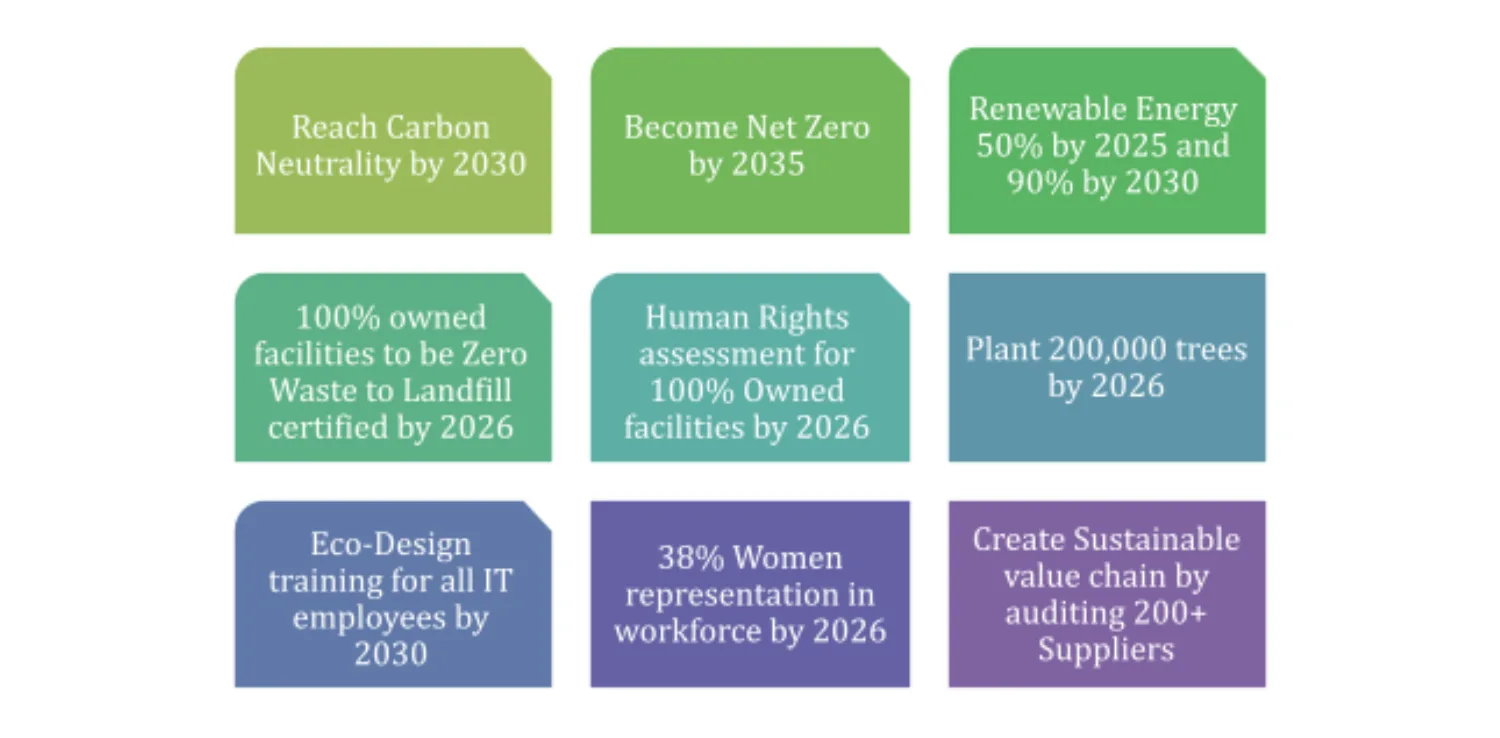An Interview with Sandeep Chandna, Chief Sustainability Officer at Tech Mahindra

Sandeep Chandna, Chief Sustainability Officer at Tech Mahindra. | Source: Tech Mahindra.
Can you tell us about your organization and your current role?
Tech Mahindra is a leading provider of digital transformation, consulting, and business re-engineering solutions. The organisation is focused on leveraging next-generation technologies including 5G, Metaverse, Blockchain, Quantum Computing, Cybersecurity, Artificial Intelligence, and more, to enable end-to-end digital transformation for global customers.
As the Chief Sustainability Officer, I oversee the comprehensive impact of corporate sustainability, including action plans, implementation strategies, and performance metrics. I also supervise the execution, monitoring, review, and reporting of our ESG strategy through the Corporate Sustainability Cell. The cell spearheads organization-wide sustainability actions based on recommendations of the Tech Mahindra Sustainability Council.
What are your corporate sustainability commitments and goals?
At Tech Mahindra, our journey is guided by setting ambitious targets and goals against each of our sustainability initiatives, wherein we measure the impact of our sustainability initiatives, emphasizing transparency and a commitment to continuous enhancement.

We have a 5-year ESG roadmap with respect to our corporate sustainability commitments and goals, currently spanning from FY22 to FY26. Our ESG targets aim to reduce our carbon footprint, strengthen communities, and enhance business continuity. Therefore, we ensure that our ESG roadmap aligns with the organization’s Sustainability Vision and Sustainability Charter. Alignment with our material topics facilitates focused stakeholder engagement, fosters innovation, and ensures accountability. It enables us to track, monitor, and report our progress effectively.
We assess our ESG roadmap under four Imperatives, each with several aspects: Business Imperative, People Imperative, Environmental Imperative, and Governance Imperative.
What have been your most difficult challenges in achieving those goals?
Considering the dynamic and evolving nature of the sustainability landscape, external factors such as regulatory changes, market shifts, and emerging sustainability trends require constant adaptation of our strategies. Staying ahead of these changes and ensuring our initiatives remain relevant and impactful demands continuous vigilance and a proactive approach.
Additionally, building effective collaborations with suppliers, communities, and industry partners necessitates careful navigation of diverse interests and priorities. Initially, it was challenging to account for all suppliers and ensure their alignment with our sustainable practices. However, we subsequently developed a sustainable supply chain policy that must be adhered to throughout the entire value chain.
What opportunities do you see to address those challenges?
In navigating the challenges on our path to embracing sustainability, we identify several opportunities that serve as catalysts for addressing these hurdles and advancing our goals.
- Innovation and Technology Adoption: Embracing innovation and leveraging cutting-edge technologies like AI, IoT, and blockchain.
- Cultural Transformation and Employee Engagement: Transforming our organizational culture towards sustainability presents a prime opportunity for our sustainability goals.
- Supply Chain Collaboration: Collaborating with suppliers who share our commitment to responsible business practices and environmental stewardship opens up sustainable supply chain management opportunities.
- Regulatory Adaptability and Proactive Compliance: We can anticipate changes and align our strategies by staying informed about emerging environmental regulations and participating in industry forums.
- Stakeholder Engagement and Collaboration: Engaging with internal and external stakeholders is a valuable opportunity to collectively advance sustainability goals.
What are the ESG material (environmental, social, and governance) issues that your organization focuses on, and how do you integrate them into your corporate sustainability?
At Tech Mahindra, we prioritize several material ESG issues to ensure a comprehensive and impactful approach towards sustainability.
Environmental Focus
- Carbon Footprint and Energy Efficiency: Mitigating our carbon footprint and enhancing energy efficiency are at the forefront of our environmental agenda. Our initiatives include investments in renewable energy sources, energy-efficient technologies, and continuous monitoring & reporting of our carbon emissions.
- Waste Management and Biodiversity: We recognize the importance of responsible waste management and preserving biodiversity. Reforestation initiatives, such as tree plantation drives, are vital to our strategy to contribute to biodiversity conservation.
- Water conservation: Recognizing the value of water as a precious resource, we are dedicated to actively managing our water usage, which is governed by our Water Management Policy.
Social Focus
- Employee Well-being and Diversity & Inclusion: Our social initiatives prioritize the well-being of our employees and promote diversity and inclusion. Specific initiatives include enhancing employee engagement, ensuring well-being and safety, and managing talent and skills effectively.
- Community Engagement: Engaging with communities is a crucial aspect of our social responsibility. Our initiatives extend beyond our immediate operations to contribute positively to the communities where we operate.
Governance Focus
- Ethical Business Practices and Corporate Governance: Tech Mahindra strongly emphasizes ethical and responsible business practices. This commitment extends to our governance focus, ensuring transparent and accountable corporate governance.
How do you communicate your corporate sustainability strategy and initiatives to internal and external stakeholders?
We prioritize internal communication by actively engaging our employees in our sustainability journey. Regular updates, newsletters, and internal communications channels are utilized to share the progress of our sustainability initiatives. Furthermore, we conduct training programs and workshops to ensure that our workforce is well-informed about sustainability goals, practices, and their role in achieving them. We also embed sustainability into our corporate culture, emphasizing its importance through internal events, campaigns, and recognition programs.
For instance – The Green Marshals, a small group of Tech Mahindra associates, are committed to leading the cause of environmental sustainability and are the force behind our associates’ green initiatives. They highlight best practices on sustainability and encourage eco-friendly initiatives as part of collective action to save our planet.
Regarding external communication, we practice transparent reporting through our Integrated Annual Report, which comprehensively outlines our sustainability performance. We also reach out to our external stakeholders through regular dialogues, forums, and engagement sessions to understand and address their concerns.
Furthermore, participation in industry forums, conferences, and partnerships with like-minded organizations allows us to share best practices, learn from others, and contribute to the broader sustainability discourse. We also maintain a strong digital and social media presence to disseminate information about our sustainability initiatives by sharing updates, success stories, and relevant content with a wider audience.
What were the most exciting initiatives and progress that you and your team have done in 2023?
In 2023, Tech Mahindra has experienced significant advancements and exciting initiatives in our sustainability journey. We’ve implemented innovative solutions and invested in renewable energy sources, including signing Power Purchase Agreements (PPA) to procure Renewable Energy for our operations, adoption of solar LED lights, water heaters, installation of LEDs/Motion Sensors, efficient HVACs/VRVs and implementation of building controls, etc.
Acknowledging the critical role of efficient data center management, we have implemented innovative solutions to enhance energy efficiency. Our Power Usage Efficiency (PUE) metrics consistently demonstrate progress and the increased utilization of renewable energy in our data centers.
What are the lessons you learned from your sustainability efforts in 2023?
In 2023, our sustainability journey at Tech Mahindra has been rich with insights and lessons that have shaped our approach and fueled our commitment to driving positive change. Here are some of the key lessons learned:
- Agility and Adaptability are Crucial: The dynamic nature of the sustainability landscape requires us to be agile and adaptable. External factors, such as regulatory changes and emerging sustainability trends, demand a proactive approach.
- Stakeholder Engagement Amplifies Impact: We’ve witnessed the power of engaged and motivated employees in propelling sustainability initiatives and hence, created programs and collaborative initiatives aimed at fostering environmental awareness amongst our stakeholders.
- Transparency Strengthens Stakeholder Trust: Clear and open communication about our progress, challenges, and future plans not only enhances accountability but also fosters stronger relationships with both internal and external stakeholders.
- Innovation Drives Sustainable Solutions: Embracing technological advancements, such as green coding practices and efficient data center management, has enabled us to make meaningful strides in reducing our environmental impact while staying ahead of industry trends.
- Materiality Matrix Guides Prioritization: The use of our Materiality Matrix has been instrumental in guiding our sustainability priorities. Identifying and prioritizing the most material ESG issues ensures that our efforts are targeted and aligned with the concerns that matter most to our stakeholders.
What are your plans for your sustainability efforts in 2024?
In 2024, Tech Mahindra is poised to embark on a transformative phase in our sustainability journey, building on the successes and insights gained in previous years.Here are the key elements of our sustainability agenda for the upcoming year:
- Accelerated Progress Toward Carbon Neutrality and Net Zero: In 2024, we will implement additional measures to accelerate our progress, including investments in renewable energy, energy-efficient technologies, and the adoption of innovative solutions to reduce our carbon footprint further.
- Employee Well-being and Inclusion: We plan to implement targeted initiatives to enhance our employee engagement, safety, and overall well-being.
- Innovation in Data Center Management: We aim to continue our innovative approach to data center management, further increasing energy efficiency and minimizing environmental impact. This involves ongoing monitoring of Power Usage Efficiency (PUE), exploring renewable energy solutions, and staying at the forefront of technological advancements in data center operations.
- Advancing Sustainability Offerings: Regarding our sustainable service offerings, our strategy involves enhancing and delving more profoundly into comprehending the needs of our customers. We aim to tailor our offerings to better meet the unique needs and preferences of our clients.
- Enhance our green platforms: We intend to dedicate additional efforts to enhance our green platforms, including i.Sustain, i.Riskman and i.Greenfinance, taking a significant stride towards achieving our green initiatives.
If you were to share advice you learned in your role that may be helpful to your peers and sustainability practitioners around the world, what would that be?
Embrace a holistic approach to sustainability that considers environmental, social, and governance (ESG) dimensions. Recognize the interconnectedness of these aspects and strive for integrated solutions that address the diverse challenges faced by businesses and communities. Foster a culture where employees feel personally connected to sustainability goals. Their passion and commitment can, therefore, amplify the success of sustainability efforts. Embrace a mindset of continuous learning and adaptation. Stay informed about emerging sustainability trends and engage in relevant workshops, conferences, and training programs. Establish clear metrics and key performance indicators (KPIs) for measuring the impact of sustainability initiatives. Regularly monitor and report progress to showcase commitment, drive accountability, and demonstrate the tangible outcomes of sustainability efforts. The implementation of a robust governance framework is invaluable, offering a meticulously defined structure of roles and responsibilities. A well-established governance framework streamlines operations and nurtures a culture of clarity, empowering employees with a lucid comprehension of their roles and expectations.
Editor: Marlis Afridah


 Strengthening Resilience amid Growing Dependence on Space Infrastructure
Strengthening Resilience amid Growing Dependence on Space Infrastructure  Indian Gig Workers Push Back Against 10-Minute Delivery Service Strain
Indian Gig Workers Push Back Against 10-Minute Delivery Service Strain  Call for Governance: Grassroots Initiatives Look to Scale Efforts to Conserve Depleting Groundwater
Call for Governance: Grassroots Initiatives Look to Scale Efforts to Conserve Depleting Groundwater  Integrating Environment, Climate Change, and Sustainability Issues into Education Systems
Integrating Environment, Climate Change, and Sustainability Issues into Education Systems  Finally Enforced: Understanding the UN High Seas Treaty
Finally Enforced: Understanding the UN High Seas Treaty  Risks and Opportunities of Submarine Communication Cables for Sustainable Development
Risks and Opportunities of Submarine Communication Cables for Sustainable Development